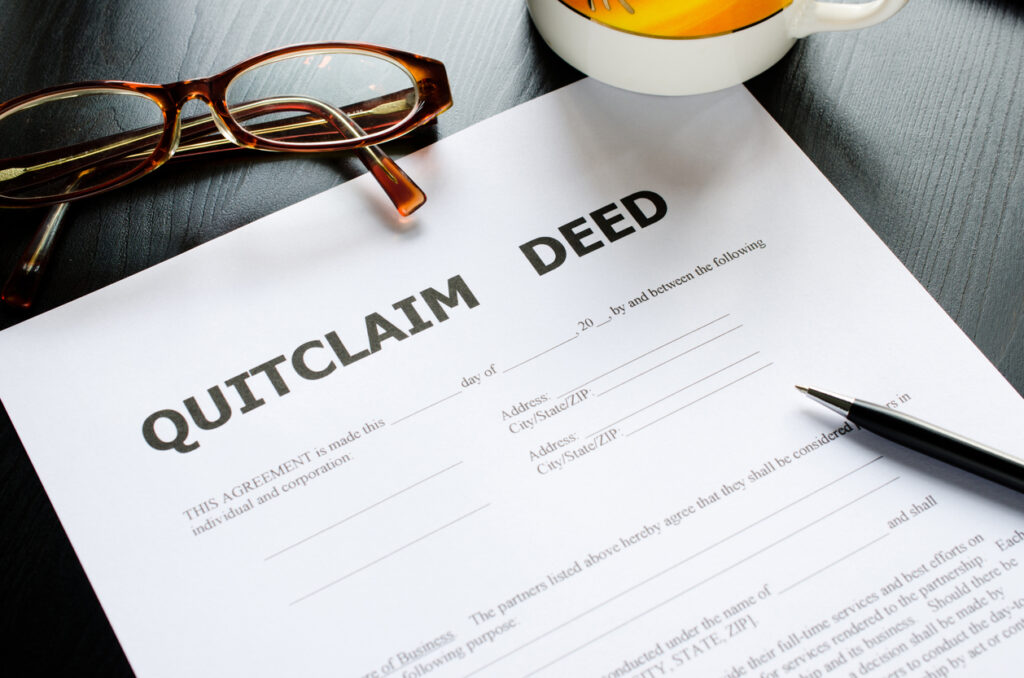Understanding How Quitclaim Deeds Work and How to Tell If You Own the Property
Most real estate transactions in Arizona involve warranty deeds. These are the traditional deeds that are used when someone is buying or selling a property. Through a warranty deed, the seller guarantees that there are no issues with the ownership of the property, such as title disputes. A quitclaim deed, however, is slightly different.
What Is a Quitclaim Deed?
A quitclaim deed transfers ownership from the current owner to the new owner — often without an actual financial transaction taking place — but no such guarantee is offered. A quitclaim deed simply transfers one person’s interest in the property to another, but it doesn’t provide any guarantee that the grantor had an interest in the property to give.
When Are Quitclaim Deeds Used in Arizona?
Because quitclaim deeds don’t offer any warranties as to what interest the grantor has in the property — or even if they are legally able to transfer ownership — they are generally only used between two parties that know each other well.
One common use of quitclaim deeds is when a married couple divorces and wants to remove one person’s name from the deed of the home. Using a quitclaim deed changes who has ownership interest without having to go through an actual sale process. This is common when one person may be giving up their claim in the home as part of the settlement when they are receiving other concessions.
Quitclaim deeds may also be used when parents want to transfer ownership of a property to their children without an actual sales transaction. They may also be used as part of estate transfers or as a way to protect assets from probate when someone is creating their estate plan. In some cases, they can also be used as part of business transactions or to correct title defects on properties.
Pitfalls of a Quitclaim Deed
While quitclaim deeds can be useful in some situations, they have some significant drawbacks to be aware of. If you aren’t sure whether a quitclaim deed is right for your circumstances, a real estate attorney can help.
You Have Little to No Legal Recourse
One of the main drawbacks of using a quitclaim deed is that you have little to no legal recourse if the grantor didn’t actually have a legal interest in the property to give away. This is the risk you take with a quitclaim deed that doesn’t offer any warranties. For example, if someone transfers a property to you via a quitclaim deed but it’s found out later on that they didn’t have any interest to transfer, you also then have no interest in the property. It’s not uncommon for people to find this out after they have moved into a property, done renovations, or are even attempting to sell it.
The only legal protection a quitclaim deed usually offers is keeping the grantor from coming back and trying to regain their interest in the property. The quitclaim deed is a legally binding transfer, so once it has been executed, the grantor has no further legal standing.
They Don’t Affect Mortgages
A common misconception about quitclaim deeds is that they can help you get your name off of a mortgage. However, a quitclaim deed is completely separate from and has no effect on the mortgage for a property. As noted, quitclaim deeds are commonly used when a married couple divorces and one person is getting the house in the settlement. Many people believe that by using a quitclaim deed to transfer their ownership of the home to their ex-spouse that they are no longer responsible for the payments and won’t carry the mortgage as a debt on their credit reports. But this is not true.
When you sign a mortgage, you agree to make the payments as specified, and a quitclaim deed doesn’t change this. The mortgage company still holds you responsible for the debt, even if you have no ownership interest in the home and aren’t living there. This means that your credit can be affected if the other party doesn’t make the payments on the property. It can also keep you from being able to qualify for your own mortgage or other loans or finance products because the mortgage will still be calculated in your debt-to-income ratio.
In order to get your name off of the mortgage, the other party will generally need to refinance the home in their name only.
You May Not Actually Own the Property
If you were transferred ownership of a property through a quitclaim deed, it’s possible you may not actually own the home at all. This is often not discovered until you attempt to sell the company and it goes through a title inspection. Finding out that you don’t actually own a property, especially one that you are currently living in or are trying to sell, can cause a variety of issues. And some of these can escalate to the point of real estate litigation. If this is a situation you’re facing, talk to a real estate attorney as soon as possible about your options.
Real estate transactions are property transfers involving complex contracts and agreements, and it’s important that everything be done in accordance with the law to ensure that your future interests are protected. If you’re considering a quitclaim deed and want to understand the pros and cons and what you should look out for, contact Resolvere Law PLLC at 480-568-1327 to ask for a FREE consultation.

 CALL US NOW
CALL US NOW







